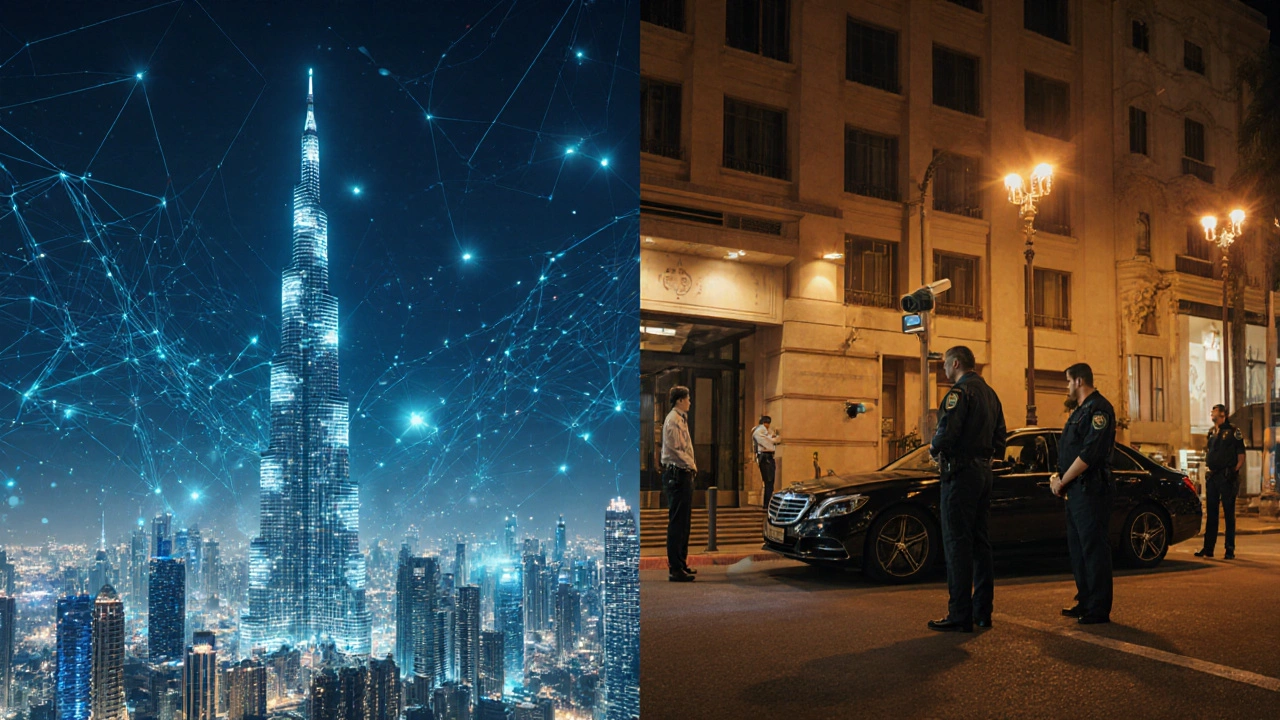In Dubai, the difference between a screen and a street can change the entire legal picture. The same activity that seems like basic advertising online might be prosecuted as a cybercrime, while a private meet-up can trigger morality and prostitution charges. This guide explains how the rules split across online and in-person contexts, what enforcement actually looks like, and where people usually misread the lines. It’s information only, not legal advice.
Dubai adult work regulations are a set of criminal, cyber, and licensing rules in the United Arab Emirates that prohibit prostitution, ban the production and distribution of pornographic material, and restrict advertising or brokering of sexual services both online and offline within Dubai. Also called Dubai sex work laws, these rules are enforced by local and federal authorities and carry penalties that can include jail, fines, and deportation for non-citizens.
Quick Summary
- In-person prostitution is illegal and heavily policed; online porn creation/distribution and escort advertising also risk cybercrime charges.
- Online activity leaves a permanent evidence trail (accounts, messages, payments). Offline stings use surveillance and undercover operations.
- Ads that imply sexual services-even with coded terms-can be prosecuted as “incitement” or “facilitation.”
- Licensed massage/spa businesses are lawful, but sexual services remain illegal under any pretext.
- Foreigners face added risk: detention, fines, and deportation. When in doubt, don’t do it; talk to a qualified UAE lawyer.
What the law actually says (in plain English)
Dubai applies federal UAE criminal law plus emirate-level enforcement. The baseline: prostitution (buying, selling, brokering sex) is illegal. Pornographic production and distribution are illegal. Public indecency and offensive content are illegal. Online promotion of sexual services is treated as a cyber offense.
United Arab Emirates Penal Code - Federal Decree-Law No. 31 of 2021 defines core crimes around prostitution, indecency, and brothels. Expect penalties that can include imprisonment and fines; non-citizens may be deported. Specific sentencing varies by facts and judicial discretion.
Cybercrime Law - Federal Decree-Law No. 34 of 2021 on Combating Rumors and Cybercrimes covers the online side: creating, hosting, sharing, or advertising pornographic content; using websites/apps to facilitate prostitution; and distributing indecent material. “I’m just posting an ad” is still distribution and facilitation online.
Anti-Human Trafficking Law - Federal Law No. 51 of 2006 targets coercion, exploitation, and organized brokering. Even without force, patterns like recruiting, transporting, or housing people for prostitution can escalate charges.
Online access itself is filtered. Telecommunications and Digital Government Regulatory Authority (TDRA) blocks porn sites and “immoral content” domestically. Attempting to operate porn distribution from within the UAE is legally risky, even if your audience is abroad.
On privacy, Personal Data Protection Law - Federal Decree-Law No. 45 of 2021 governs handling of personal data. It does not make illegal content legal; it simply adds rules for how lawful businesses must process data.
Online vs in‑person: same goals, very different risks
Both contexts are criminalized, but the exposure points differ. Online, your trail is digital: profiles, chats, bank transfers, IP addresses. Offline, it’s presence, surveillance, and testimony. Here’s a side-by-side snapshot.
| Criteria | Online activities (ads, content, coordination) | In-person activities (meetups, brokering) |
|---|---|---|
| Primary laws triggered | Cybercrime Law; Penal Code indecency/prostitution provisions | Penal Code prostitution/brothel; indecency; immigration rules |
| Typical evidence | Profiles, DMs, payment records, device forensics, IP logs | Undercover stings, surveillance, witness statements, location evidence |
| Advertising risk | High: ads = distribution/facilitation; platform T&Cs violations | High: flyers, word-of-mouth brokering, venue-based solicitation |
| Platform mediation | Accounts can be flagged, suspended, or reported to authorities | Venues can eject, report, or be penalized for tolerance |
| Enforcement pattern | Digital monitoring, tip-offs, cross-border cooperation | Patrols, sting operations, targeted raids |
| Penalty exposure | Jail/fines for cyber offenses, indecency; deportation possible | Jail/fines for prostitution-related offenses; deportation common for non-citizens |
| Collateral risks | Account seizures, device forensics, reputational harm | Immigration violations, venue bans, reputational harm |
How platforms, ads, and payments change the picture
People often assume “private” accounts are safe. They’re not. Major platforms ban sexual services and porn anyway, and they cooperate with law enforcement when required.
OnlyFans allows adult content under its own policies, but producing or distributing porn while physically in the UAE can still fall foul of local law. Location matters as much as the audience. Account verification, bank payouts, and IP logs create a trail.
Instagram and Telegram are common channels for coded ads. But on the legal side, “coded” is still content. If the intent is sexual services, it risks counts like incitement or facilitation. Platforms also enforce their own anti-sexual solicitation rules, so removal or reporting can happen before police even enter the picture.
Payments add another layer. UAE banks apply AML/CFT monitoring; unusual incoming transfers from many small senders, references, or chargebacks can trigger reviews. Card processors and e-wallets have “high-risk” policies. A blocked payout can become the first domino that tips off a compliance inquiry.
Business licensing doesn’t fix this. A license for a Dubai Department of Economy and Tourism-registered wellness or entertainment business does not legalize sexual services. A licensed massage center can still face penalties if sexual services are offered.
Enforcement: what actually happens on the ground
Authorities in Dubai have both digital and field tools. Online, complaints and automated detection can lead to account suspensions, device seizures, and investigations. Offline, stings and surveillance focus on brokering, organized operations, and repeat activity.
Dubai Police handle cases ranging from indecency to trafficking. Evidence can include undercover messages, meeting arrangements, and payments. Once devices are examined, older chats and media often surface-so “I deleted it” rarely helps.
Two things many people underestimate:
- Deportation risk for non-citizens is real, especially for prostitution-related convictions.
- Cyber offenses can stack with indecency counts. One ad can implicate multiple laws.
Timelines vary. Some cases resolve quickly; others take months while devices are analyzed and statements collected. During that time, passports can be held, and travel restricted.

What’s clearly not allowed vs. what often gets confused
Not allowed, both online and offline:
- Buying, selling, or brokering sexual services.
- Producing or distributing pornographic content from within the UAE (even if your audience is abroad).
- Advertising or “suggestive” listings that imply paid sexual services, including coded language and emojis.
- Operating or hosting a site/app that facilitates prostitution or porn distribution accessible in the UAE.
Common confusions:
- “Private accounts are fine.” No-intent and content still matter under the Cybercrime Law.
- “If it’s consensual, it’s okay to sell.” Consensual sex and commercial sex are different legally; prostitution remains illegal.
- “A massage/spa license covers extras.” It does not. Sexual services remain illegal under any pretext.
- “Foreign sites make it legal.” Location of the person posting and distributing matters in UAE law.
Nuance to know: Reforms in recent years relaxed certain personal morality provisions (like cohabitation). That did not legalize prostitution, porn production, or online sexual solicitation. Don’t conflate private relationships with commercial sex.
Practical checklist to avoid crossing legal lines
If your work touches modeling, wellness, night-life promotion, or content creation, use this conservative checklist. If any answer is “yes,” stop and get licensed legal advice.
- Does the activity involve sexual services for money or anything of value?
- Does the post, ad, or message directly or indirectly solicit sexual services?
- Is any explicit content being created, uploaded, sold, or streamed from within the UAE?
- Could your wording, emojis, pricing, or “discreet” codes be read as sexual solicitation?
- Are you brokering or arranging meetings between other adults for paid sexual services?
If you operate a lawful business (e.g., legitimate wellness, modeling, or photography), keep guardrails:
- Clear service menus with no sexual implications; staff training that zero-tolerance means zero.
- Advertising guidelines that avoid any suggestive or coded language.
- Platform policy compliance and moderation of comments/DMs.
- Documented refusal and incident logs if someone requests illegal services.
Scenarios: how the rules hit real life
Scenario 1: A resident creator sells explicit videos to overseas fans using a global platform while filming in Dubai. Legal risk: high. Even if buyers are abroad, the production and distribution location is the UAE, where porn distribution is illegal; cyber provisions can apply.
Scenario 2: A tourist posts a “massage” ad on a messaging channel with winking language and rates, then arranges a hotel visit. Legal risk: high. That’s solicitation and facilitation online, plus in-person prostitution exposure on arrival.
Scenario 3: A licensed spa notices a staffer hinting “extras” to repeat clients. Legal risk: high for the individual and the business. Action: formal warnings, retraining, compliance audits, and if needed, termination and reporting.
Scenario 4: A nightlife promoter uses ambiguous captions to drive VIP bookings. If the implication is sexual services, cyber and prostitution laws can be triggered. Strip the innuendo and keep offers to lawful hospitality (tables, drinks, shows) with clear T&Cs.
How this affects agencies, venues, and managers
Any third party who “procures,” “facilitates,” or “profits from” prostitution faces elevated risk. That includes agencies, drivers, venue staff, and ad brokers. Even if you never take cash for a sexual act, brokering is enough.
Operational guardrails:
- Written policies banning sexual solicitation and brokering on business channels.
- Pre-approved ad templates reviewed for compliance.
- Escalation protocol when staff see or receive sexual requests (document and decline).
- Vendor due diligence; avoid partners whose business models hint at illegal services.
Evidence, records, and why “quietly deleting” backfires
Digital forensics can recover deleted messages, images, and metadata. Payment records, ride-hailing logs, hotel registrations, and CCTV can corroborate timelines. In short, it’s very hard to make a digital footprint disappear.
If an inquiry starts, statements you make online can be compared against device data later. Inconsistent stories hurt credibility. Don’t self-incriminate in chats. If you’re contacted by authorities, seek counsel before providing statements.
Key entities and why they matter
To keep the landscape straight, here’s who and what frequently show up in cases:
- United Arab Emirates Penal Code: core offenses (prostitution, indecency, brothel management).
- Cybercrime Law: online content, distribution, advertising, facilitation.
- Anti-Human Trafficking Law: recruitment, transport, coercion, organized brokering.
- Telecommunications and Digital Government Regulatory Authority: content filtering and takedowns.
- Dubai Police: frontline enforcement and investigations.
- Personal Data Protection Law: data handling for lawful businesses (doesn’t legalize illegal content).
- Dubai Department of Economy and Tourism: licensing of lawful venues and services; not a shield for illegal acts.
- OnlyFans, Instagram, Telegram: platforms where people often get into trouble.
Decision helper: five quick questions before you post or meet
- Could a reasonable person read your words or images as offering sexual services for money?
- Are you planning to film, stream, or sell explicit content from inside the UAE?
- Does your ad or DM include prices, time blocks, hotel references, or coded sexual slang?
- Are you arranging or brokering a meeting for someone else for a cut?
- Would you be comfortable showing the post, chat, and payment record to a regulator?
If any answer is “yes,” do not proceed. Ask a UAE-qualified lawyer for advice.
Next steps and troubleshooting
If you’re a resident content creator: Don’t produce, upload, or sell explicit content from inside the UAE. Avoid “suggestive services” ads. If your work is lawful (fashion, fitness, beauty), keep brand-safe language, clear consent documentation for shoots, and store data per PDPL.
If you’re a tourist: Avoid any meetups or ads that imply paid sexual services. Hotel and venue security teams cooperate with authorities. A single “what’s your rate?” message can be enough to escalate.
If you run a wellness or hospitality business: Train staff, audit ads, and create a written refusal protocol. Remove any suggestive language from menus and posts. Keep CCTV and booking logs in case you need to prove you declined an illegal request.
If you’ve already posted something risky: Don’t panic, but don’t try to cover tracks. Stop posting, save records, and get legal advice. Voluntary correction (e.g., removing suggestive language) may help-but only a lawyer can guide you safely.
Frequently Asked Questions
Is prostitution legal in Dubai?
No. Buying, selling, or brokering sex is illegal under the UAE Penal Code. Penalties can include jail, fines, and deportation for non-citizens. Enforcement is active in both online and offline contexts.
Is it legal to create or sell adult content online from within the UAE if my customers are abroad?
Producing or distributing pornographic content from inside the UAE risks charges under the Cybercrime Law and indecency provisions, regardless of where your audience lives. Location of the creator matters, not just the viewer’s location.
Can coded ads or emojis avoid legal trouble?
No. If a reasonable person can read the post as offering sexual services, it can be treated as facilitation or incitement. Platforms may remove it, and authorities can still act on it.
Do private DMs or closed groups make it safer?
Not really. Messages can be reported, devices can be seized, and platforms or payment providers can cooperate with lawful investigations. Private spaces still leave digital evidence.
Are licensed massage or wellness businesses allowed to offer sexual services if the client consents?
No. Licenses cover lawful wellness services only. Sexual services remain illegal regardless of consent or wording. Both staff and owners can face penalties if such services are offered.
Could a foreign website make it legal if the activity happens in Dubai?
No. UAE law applies based on where the conduct occurs. Operating from Dubai to produce or distribute porn or to broker sexual services can still violate local laws even if the platform is overseas.
What are the most common mistakes that lead to charges?
Coded ads that clearly imply sexual services; filming explicit content in the UAE for sale; brokering meetings; and assuming private accounts or closed groups are immune from law. Payment patterns can also draw attention.
If contacted by authorities, what should I do first?
Stay calm, don’t delete anything, and seek advice from a UAE-qualified lawyer before making detailed statements. Self-incrimination in chats or interviews can complicate your situation.





